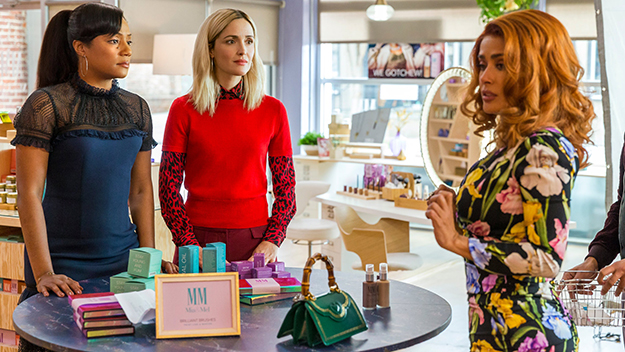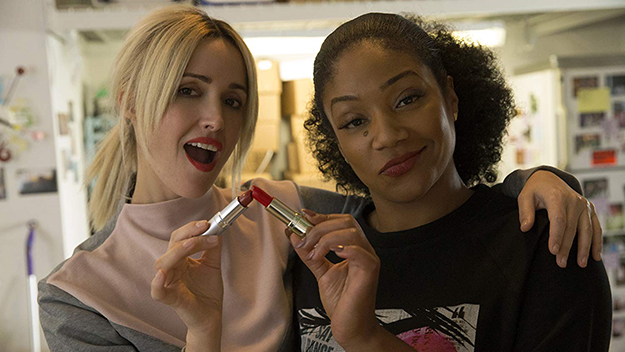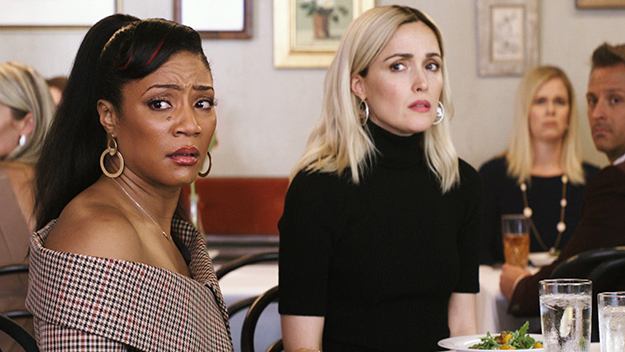Deep Focus: Like a Boss

Images from Like a Boss (Miguel Arteta, 2020)
“Good ideas do not come to me if they are forced,” says Tiffany Haddish as a natural born cosmetics whiz in Like a Boss. Haddish should apply that precious wisdom to her movies. Almost everything about Like a Boss is contrived and labored. From the opening scene of Haddish, as Mia Carter, recounting her latest sex dream to her best friend, housemate, and business partner Mel Paige (Rose Byrne), to the final shot of the two screaming “We did it” as their new makeup company “Proud” goes international, Like a Boss means to celebrate the potent beauty of sorority.
The movie isn’t about sisterhood being powerful, though. It’s about sisterhood being packageable. It’s the ultimate tick-the-boxes sort of film, starting with the presentation of Haddish herself. Pitched to Paramount as a vehicle for Haddish after her showcase role in Girls Trip (2017), the script by Sam Pitman and Adam Cole-Kelly tries too hard to exploit her gift of exuberance, her flair for unabashed vulgarity, and her specialty of shifting in a nanosecond from intense, self-centered tunnel-vision to bayonet attacks on the hypocritical nonsense surrounding her.
The screenplay propels her on a collision course with the 100% artificial international beauty tycoon Claire Luna (Salma Hayek), who plans to corrupt and control Mel and Mia’s boutique company by splitting up the team. Mel and Mia strive to design products that accentuate women’s strengths without apologizing for their flaws, and thus let their inner lights shine through. Claire urges the partners to be “fiercst” (sic) so they can “inspire the ugly people to buy themselves into gorgeousness.”
The movie sets up Claire as a cartoon villain, part Meryl Streep in The Devil Wear Prada, part kooky Latina Maleficent—the animated Disney badass, not the post-Wicked, Angelina Jolie, misunderstood version. By contrast, Mia is meant to come off as a down-to-earth superhero, Captain Natural, but sadly, she turns into Captain Obvious.

Even Haddish’s randy riffs and outbursts grow tiresome. It’s fun but familiar to hear her describe fantasy sex with Barack Obama as “dignified,” “confident,” and “presidential.” It’s killingly repetitive to hear her pepper her dialogue with so many “hoochies” and “coochies.” This script, with its roots in 2017, seems out of sync with what we expect of Haddish in 2020. Her breakthrough explosiveness has done its job—we need to see other aspects of her talent. She’s at her best here with crazy logic. During a baby shower filled with college buddies now smugly married, Mia and Mel inadvertently smoke a joint in a room where one mom has parked her infant son. Mia assures Mel the babe will sleep more deeply and grow up to be a “philosopher.”
Gender politicians needn’t worry: Like a Boss is the kind of would-be edgy movie that will never alienate any segment of its target audience. Initially harsh toward that circle of suburban matriarchs, the movie ultimately reveals them as a great bunch of gals who are key to Mel and Mia’s success. Of course, the moviemakers pitch Claire’s callousness so high that a similar turnaround would be impossible, but they do provide her with a former partner who exemplifies genuine female mentorship in this film’s fantasy universe of tycoonery. (The casting of that role with a contemporary comic icon is one of the film’s few pleasant surprises.) And Claire is at least formidable, unlike the obligatory dumb cisgender men, Ron (Jimmy O. Yang) and Greg (Ryan Hansen), who run a rival company, Get Some, under the motto, “Get some Get Some, to get some,” and the assumption that as straight men they know what makes women attractive. They’re also behind the “Post Date” app: men rate their dates, then advise them on how to improve. The message is that men should get out of the women’s appearance business. If so, should they also get out of the female empowerment game? After all, apart from Danielle Sanchez-Witzel, who shares story credit with the scriptwriters, men comprise the writing-directing team behind Like a Boss.

Through no fault of her own, Byrne, who was a lot funnier as a Bulgarian femme fatale in Paul Feig’s Spy (2015) than either Haddish or Hayek is here, proves a washout as Mel. The director, Miguel Arteta, scales Byrne down as relentlessly as he hypes Haddish and Hayek up. Her squints and mewls don’t provide comic counterpoint to her costar’s cataclysmic gestures, because that’s not how comedy pairs function. The pathetic figure—Stan Laurel or Art Carney—should be as or more vivid than the rowdy one—Oliver Hardy or Jackie Gleason. What’s worse, the script turns Mel into the ultimate weak sister. We’re told that she’s the practical soul who makes Mia’s artistry possible. Instead she registers as a passive-aggressive parasite. Since she lacks the gumption and ingenuity to angle Mia’s runaway creativity into a business plan, she welcomes Claire as a financial savior and guide to handling an unruly partner. She’s needy and she’s foolish. After Mia demonstrates that the way to fight Claire for autonomy is with outrageous bravado (in this case, staging an office invasion and throwing blunt objects at security guards), Mel swiftly reverts to obsequiousness.
Hayek, who splendidly played still waters running deep and then flooding out in Arteta’s 2017 Beatriz at Dinner (in some ways a gentle precursor to Parasite), supplies cast-iron flamboyance as Claire. Her heaviness weighs the movie down, though two supporting players contribute amusing bits around the edges. Christopher Guest stock player Jennifer Coolidge (Best In Show, A Mighty Wind, For Your Consideration) makes sweetly daft music out of existential confusion as Mel and Mia’s employee, while Billy Porter as their master chemist and makeup artisan brings an arch elegance to a movie desperately in need of it. The filmmakers use Atlanta’s wholesale trade center, AmericasMart, as the location for Claire’s dazzling and intimidating office complex. It resembles any ordinary old Hyatt, Westin, or Marriott: in fact, it was designed by Atlanta architect John C. Portman, the father of the atrium hotel.
The whole movie is a testament to bad faith. It portrays the makeup market as totally malleable in one sequence and hungry for Mel and Mia’s authenticity in the next. Arteta and company don’t convince us that their products are something special. Their biggest success is a One Night Stand recovery kit filled with single use supplies of cosmetics. That’s not an imaginative masterstroke—it’s a marketing idea. So is this movie.
Michael Sragow is a contributing editor to Film Comment and writes its Deep Focus column. He is a member of the National Society of Film Critics and the Los Angeles Film Critics Association.Haddish







